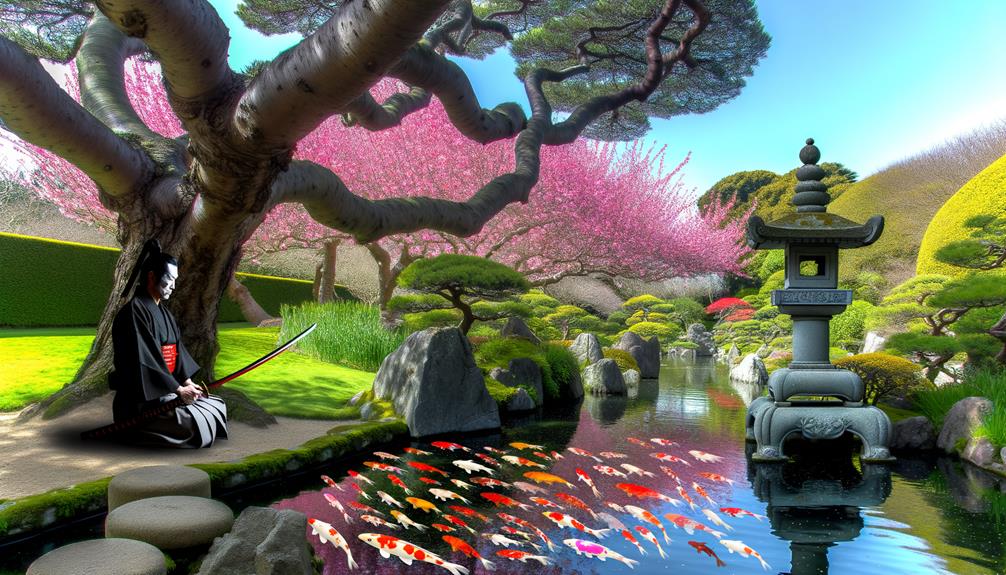Meaning of the Name Kenji
The name Kenji, originating from Japan, is conventionally crafted from kanji characters representing 'healthy' (健) and 'strong' (二), reflecting the cultural emphasis on vitality and energy. Historically, it is often bestowed upon second-born sons, highlighting familial roles and Confucian values.
Its connection with noble families and samurai adds layers of historical prestige. Kenji has experienced fluctuations in popularity but maintains a modern presence.
Distinguished individuals like poet Kenji Miyazawa and filmmaker Kenji Mizoguchi exemplify the name's enduring cultural impact. This fusion of traditional and contemporary significance provides a deeper insight into its rich heritage.

Key Takeaways
- The name Kenji originates from Japan and means 'healthy' and 'strong'.
- Kenji is often given to second-born sons, reflecting familial hierarchies.
- The name symbolizes physical strength, health, and vigor.
- Kenji has deep historical and cultural significance, associated with noble families and samurai.
- The name has been popular in various eras and maintains a balance between traditional values and modern influences.
Etymology of Kenji
The name Kenji originates from Japan and is traditionally composed of the kanji characters '健' (ken), meaning 'healthy' or 'strong,' and '二' (ji), meaning 'second' or 'two.' This etymology reflects the cultural importance of health and vigor, as well as the numerical significance often found in Japanese names.
Historical records show that the name Kenji has been used for centuries, often bestowed upon second-born sons, emphasizing familial hierarchy and expectations. Linguistically, the kanji characters are deeply rooted in classical Chinese, which influenced Japanese script and language.
Over time, Kenji has evolved, but its core meaning remains intact, providing a rich blend of historical and linguistic depth that continues to resonate within Japanese society.
Cultural Significance
In Japanese culture, the name Kenji carries profound significance, symbolizing not only physical strength and health but also reflecting the societal value placed on familial roles and hierarchies.
The name Kenji is often composed of the kanji '健' (ken), meaning 'healthy' or 'strong,' and '二' (ji), which can denote the second son or imply a secondary position within the family structure. This aligns with Japan's deep-rooted Confucian values, where family status and harmony are paramount.
The choice of kanji can vary, allowing for flexibility in meaning, yet consistently underscores virtues such as fortitude and familial duty. Therefore, Kenji is more than a mere identifier; it encapsulates key cultural ideals and expectations in Japanese society.
Historical Context
The name Kenji has its roots in ancient Japanese culture, where it was often associated with noble families and samurai. Its linguistic components, 'ken' meaning 'healthy' or 'strong' and 'ji' meaning 'second son,' reflect societal values and familial structures of the time.
In modern culture, Kenji maintains its traditional resonance while also symbolizing a connection to Japan's historical heritage.
Ancient Japanese Origins
Rooted in the rich tapestry of ancient Japanese culture, the name Kenji finds its origins in the confluence of linguistic evolution and historical significance.
The name is typically composed of two kanji characters: “Ken” (賢), meaning wisdom or intelligence, and “Ji” (二), often symbolizing the number two or a second son.
Historically, the use of kanji in names was influenced by Chinese characters, reflecting cultural exchanges during the Asuka and Nara periods.
The adoption of these characters imbued names with profound meanings, often reflecting familial roles or aspirations. Therefore, Kenji not only embodies a linguistic heritage but also offers a glimpse into the societal values and familial structures of ancient Japan.
Kenji in Modern Culture
Frequently celebrated in contemporary media and literature, the name Kenji serves as a bridge connecting modern Japanese identity with its historical and cultural roots. This name, which can be interpreted as 'wise second son' or 'strong and vigorous,' continues to resonate in today's society due to its deep historical and linguistic significance.
Kenji is frequently depicted in various cultural forms, underscoring its enduring popularity and relevance.
- Literature: Kenji Miyazawa, a renowned poet and author, has immortalized the name through his significant contributions to Japanese literature.
- Cinema and Anime: Characters named Kenji often embody traditional values and modern sensibilities, reflecting the dynamic nature of contemporary Japanese culture.
- Music and Pop Culture: Popular musicians and artists named Kenji further cement the name's place in modern cultural consciousness.
Common Kanji Variations
The name Kenji can be represented using various kanji characters, each imbuing the name with distinct meanings and nuances.
Common kanji combinations include 健二 (healthy second son), 賢治 (wise ruler), and 謙司 (humble servant), reflecting different cultural and historical values.
The evolution of these kanji characters highlights the shifting societal priorities from traditional virtues to more contemporary interpretations.
Popular Kanji Combinations
In analyzing the name Kenji, one must consider the diverse array of kanji combinations that not only influence its meaning but also reflect historical and cultural nuances. The kanji characters selected for 'Kenji' can vastly alter its interpretation, often embodying values or attributes esteemed in Japanese society.
For instance, '健' (ken) can mean 'healthy' or 'strong,' while '二' (ji) signifies 'second,' suggesting the second son in a family. Another prominent combination is '賢' (ken), denoting 'wise,' paired with '治' (ji), meaning 'govern,' together implying a wise ruler.
- '健二' (Healthy Second)
- '賢治' (Wise Governance)
- '研二' (Study Second)
These variations underscore the rich linguistic and cultural heritage embedded within the name 'Kenji.'
Historical Kanji Meanings
Historical kanji meanings of the name 'Kenji' reveal a profound tapestry of linguistic roots and cultural significance, tracing back to classical Japanese literature and governance.
The name 'Kenji' can be composed of various kanji characters, each imbuing it with unique meanings. For instance, '賢' (ken) denotes wisdom or intelligence, while '二' (ji) signifies the number two, symbolizing balance or succession.
Another common variation, '健' (ken), conveys health or strength, paired with '治' (ji), meaning governance or administration. These combinations reflect the esteemed qualities valued in historical Japan, such as wisdom, strength, and leadership.
Consequently, the choice of kanji in naming practices underscores the cultural emphasis on virtues and societal roles.
Modern Kanji Interpretations
Building upon the rich historical tapestry of kanji meanings, modern interpretations of the name 'Kenji' often reflect contemporary values and societal shifts while maintaining connections to traditional virtues. The kanji characters chosen in recent times highlight a blend of old and new, revealing much about evolving cultural priorities.
- 健二 ('Ken' meaning 'healthy' and 'Ji' meaning 'second'): Emphasizes physical well-being and familial continuity.
- 賢治 ('Ken' meaning 'wise' and 'Ji' meaning 'govern'): Suggests intellectual prowess and leadership qualities.
- 謙司 ('Ken' meaning 'humble' and 'Ji' meaning 'administer'): Reflects humility and administrative abilities, resonating with modern professional ethics.
These variations illustrate how the name 'Kenji' adapts, aligning with both historical significance and present-day ideals.
Popularity Over Time
Although the name Kenji has roots in traditional Japanese culture, its popularity has experienced significant fluctuations over the decades, influenced by various social and cultural factors. Historically, the name saw a surge in the mid-20th century, likely tied to the post-war cultural renaissance and the rise of influential figures bearing the name. This trend, however, saw a decline in the later decades of the 20th century, as Western names began gaining popularity in Japan.
| Decade | Popularity Trend |
|---|---|
| 1950s | Rising |
| 1980s | Declining |
| 2020s | Steady |
In contemporary times, Kenji maintains a steady presence, reflecting a balance between traditional values and modern influences. This balanced popularity underscores the evolving yet enduring appeal of the name Kenji in Japanese society.
Famous Personalities Named Kenji
Numerous prominent individuals named Kenji have left an indelible mark on various fields such as literature, film, and sports, contributing to the name's rich cultural legacy. This impact reflects the name's deep historical roots and linguistic significance in Japanese culture.
- Kenji Miyazawa: An influential poet and children's author, his works blend naturalism and Buddhist themes, embodying the cultural depth of the name.
- Kenji Mizoguchi: A celebrated filmmaker known for his poignant, socially conscious films, Mizoguchi's contributions to cinema have solidified his status as a luminary in Japanese and global film history.
- Kenji Goto: As a revered journalist and humanitarian, Goto's dedication to reporting on global conflicts and humanitarian crises underscores the name's association with compassion and bravery.
These individuals exemplify the versatile and profound legacy of the name Kenji.
Modern Interpretations
In contemporary times, the name Kenji continues to resonate deeply, embodying a blend of traditional Japanese values and modern cultural influences.
Historically rooted in the kanji characters 刃 (ken, 'sword') and 二 (ji, 'second'), Kenji often symbolizes strength and order. The name's essence has evolved, reflecting contemporary ideals while maintaining its traditional significance.
Today, it appeals to parents seeking a name that conveys a harmonious balance of cultural heritage and contemporary identity. In popular culture, Kenji is frequently associated with characters that exemplify courage and wisdom, further enhancing its appeal.
This duality of meaning allows the name to remain relevant, embodying a rich, multifaceted identity that bridges historical depth with modern dynamism.
Conclusion
The name Kenji, with its rich etymology and cultural significance, serves as a melodic thread weaving through Japan's historical and linguistic tapestry.
Its various kanji characters offer glimpses into the multifaceted nature of this timeless name.
Over centuries, Kenji has graced the annals of history, carried by notable figures whose legacies endure.
Today, the name continues to resonate, a harmonious blend of tradition and modernity, encapsulating the enduring spirit of its bearers.






